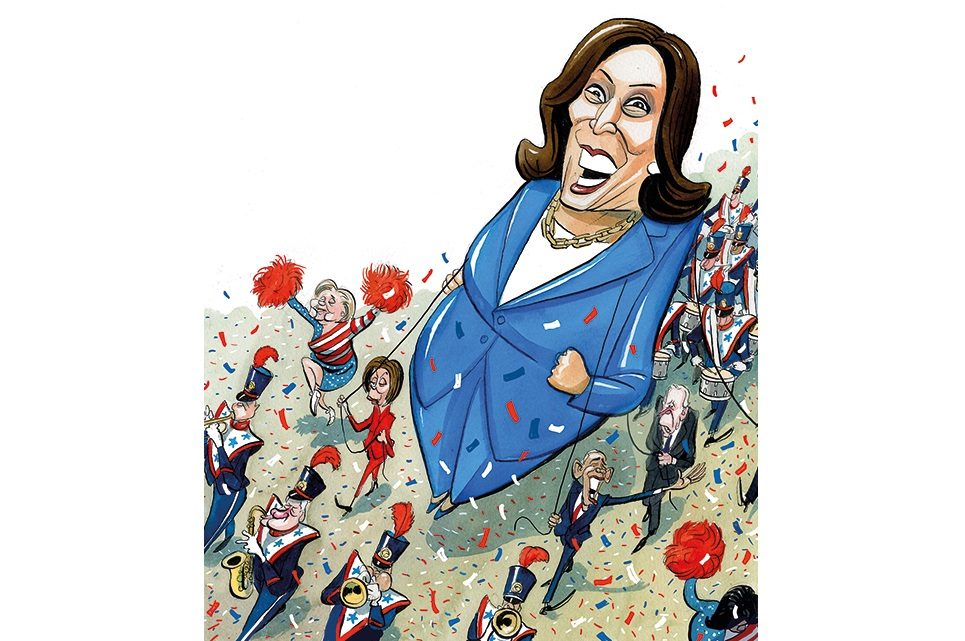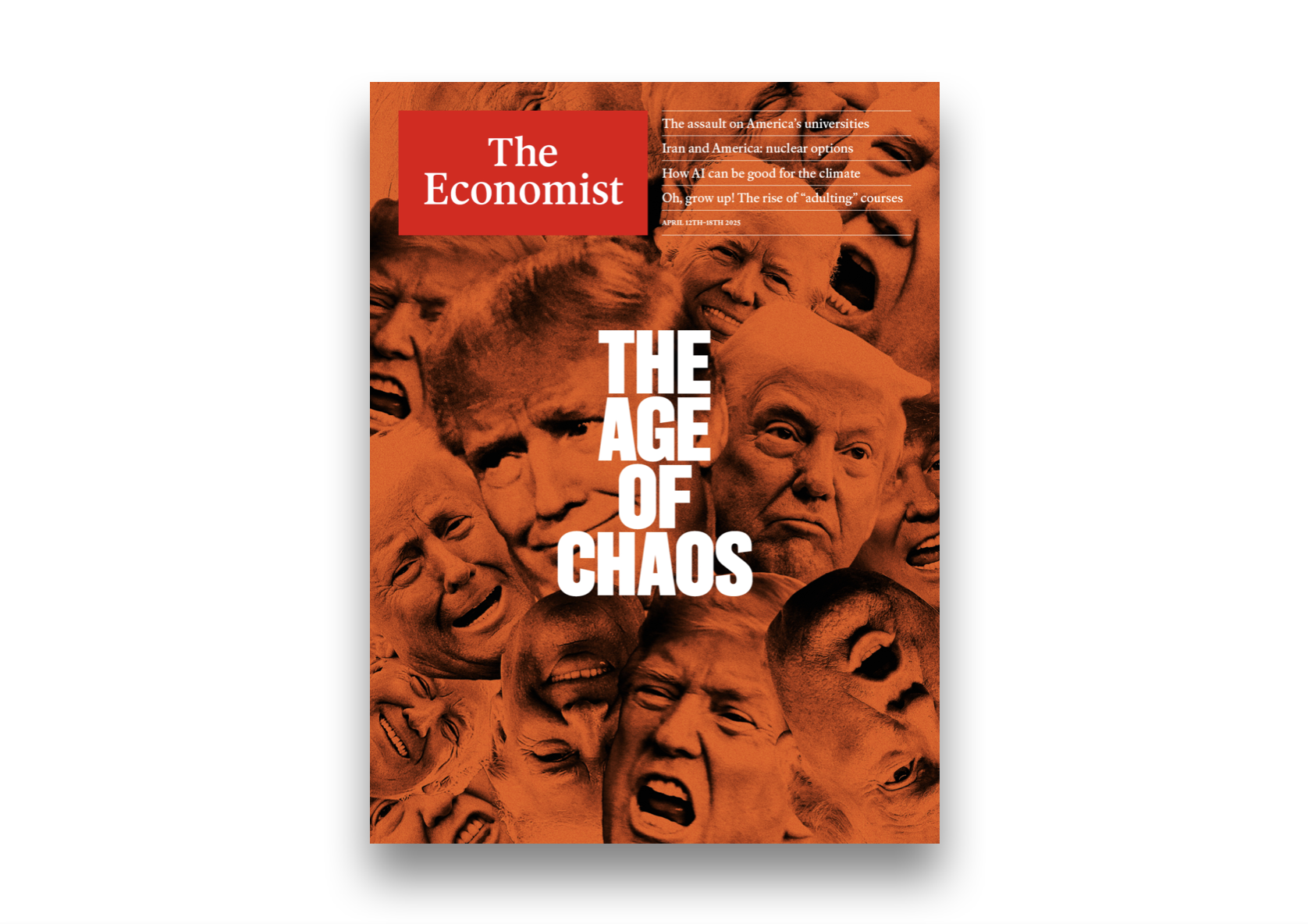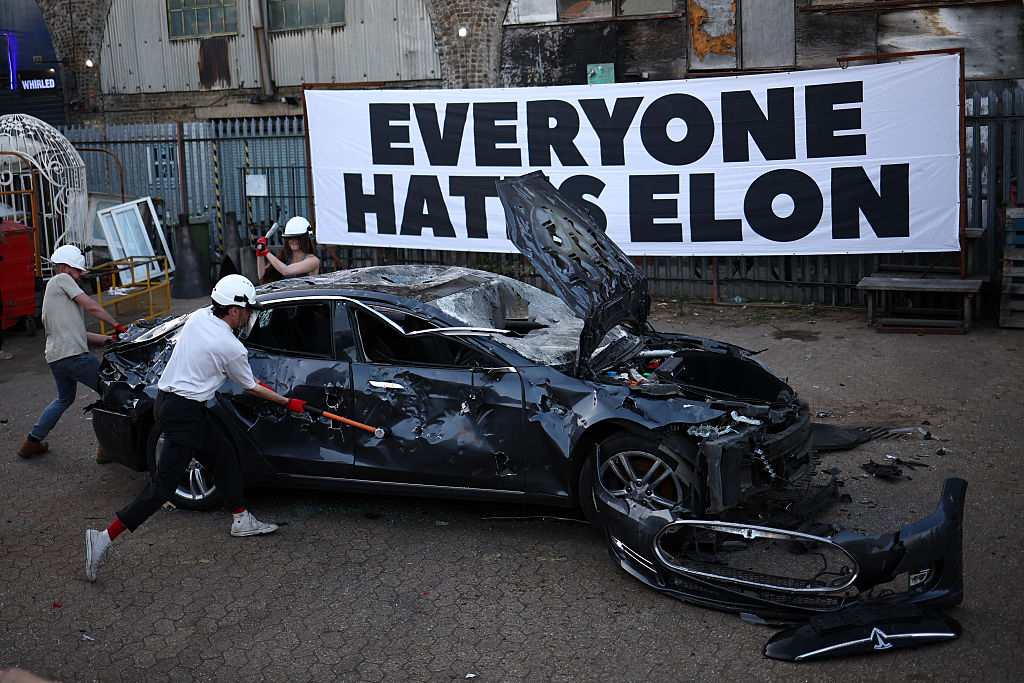Chicago
“There are no disasters,” said Britain’s former prime minister, Boris Johnson, who was born in America. “Only opportunities. And, indeed, opportunities for fresh disasters.”
That quote speaks nicely to the story of the Democratic Party’s 2024 election campaign. The first televised presidential debate, in Atlanta, Georgia on June 27, seemed to have been an absolute disaster. President Joe Biden’s clear and present feebleness had been exposed for all the world to see. His opponent, Donald Trump, became the favorite to win back the White House — then, sixteen days later, Trump survived an assassination attempt and his stock rose even higher.
Harris is a pop-up nominee in an age of diminished attention spans, which gives her candidacy a strange power
Biden was going to lose, but most Democrats were reluctant to remove him because his obvious replacement, Kamala Harris, was the least popular vice president in history.
Fast forward to today, however. Biden is out, Vice President Kamala Harris is in, and she has overtaken Trump in the polls. From being a catastrophe, that terrible debate now seems to have been the cathartic moment that the Democrats needed to turn their fortunes around. “What it did is it put reality in our face,” says Christopher Hale, a Democratic fundraiser.
Looking back, party insiders believe that the decision — probably taken by Biden’s closest advisors, Mike Donilon and Anita Dunn — to hold the debate in June, rather than September or October, was a stroke of accidental genius. It was early enough to give the Democrats time to push a broken Biden off the presidential ticket — and sufficiently late to mean his replacement could run a short campaign that avoided the full scrutiny of an election year.
Harris is a pop-up nominee in an age of diminished attention spans, which gives her candidacy a strange new power. The hapless vice president has been reinvented as Kamala the political superstar — and all the activists at Democratic National Convention in Chicago this week seem wildly excited.
It’s all very odd. In a matter of weeks, Harris has somehow become the Democratic presidential nominee without even giving a press conference or interview. Her campaign website is still missing any information about her policies yet the media keep calling her candidacy “flawless.”
The hype is working. Harris’s vice-presidential nominee, the sixty-year-old governor of Minnesota Tim Walz, has quickly become the only major party candidate in America to have a positive approval rating. He’s widely hailed as “America’s dad” — because nothing is too cheesy for US politics.

On Monday, Harris made a surprise early appearance on stage at the United Convention Center. “This November,” she said, “we will come together and declare with one voice as one people: ‘We are moving forward’ — with optimism, hope and faith.” The crowd went bananas, despite her saying almost nothing of substance. Later, Hillary Clinton appeared on the same stage to say that Harris could go further than her by finally smashing the patriarchal “glass ceiling” to become the first female president. “My friends,” she said, “when a barrier falls for one of us, it falls and clears the way for all of us.” Who needs policies when you can make history instead?
Speaking of history, Biden also appeared on Monday to give his own valediction. He shuffled out at the insultingly late time of 10:30 p.m. — and received a five-minute standing ovation. He dabbed his eyes with his handkerchief. “I love you all, folks,” he said. “And America, I love you.” He promised to be “the best volunteer Harris and Walz’s camp have ever seen.” The music system blared out Steve Winwood’s “Higher Love” as he slowly disappeared off stage.
But all the schmaltz and the upbeat “vibes” could not quite disguise the grubby reality of the Biden-Harris switch up. Everybody knows that Joe did not fall nobly on his sword. Biden was forced out of the race by the Democratic top brass, including Nancy Pelosi, the former speaker of the House. “Sometimes you just have to take a punch for the children,” replied Nancy, mysteriously, when asked this week about “bad blood” between her and the man who is still commander-in-chief.
On Tuesday night, Mr. and Mrs. Obama, the two most popular Democrats in the world, took to the convention stage and talked as if Trump was still in the White House and Harris was not the serving vice president.
Former First Lady Michelle declared that, thanks to Harris, “hope is making a comeback.” She condemned Trump for “doubling down on his ugly, misogynistic, racist lies” and “demonizing our children.” “We don’t need four more years of bluster and chaos,” added Barack. “We’ve seen that movie. And we all know that the sequel’s usually worse.” He continued: “A Harris-Walz administration can help us move past some of the tired old debates that keep stifling progress, because at their core, Kamala and Tim understand that when everybody gets a fair shot, we’re all better off.”
Harris, who has long sought to style herself as “the female Obama,” must have enjoyed all that. Her goal now is to resurrect the Obama coalition, which brought together centrist Democrats and young progressives under the banner of “hope and change.” The Harris-Walz campaign prefers “joy” as its leitmotif, but like Obama it seeks to mix caution with left-wing enthusiasm.

Harris and Walz are also hijacking the libertarian language of the right to talk about their conspicuously unconservative agenda. On abortion, Harris says Americans should be free to make personal decisions without “government telling them what to do.”
Walz, for his part, says that “some of us are old enough to remember when it was Republicans who were talking about freedom… There’s a golden rule. Mind your own damn business!”
“Mind your own business” also seems to be the Harris campaign’s implicit response to anybody who wants to know what she stands for. At the convention, speaker after speaker talked about her “vision” and her “values.” But nobody said what they were. Doug Emhoff, Harris’s husband, said that Kamala is someone who “fights for what she believes in.” But he also couldn’t say what she believes in. She’s an empty vessel.
The Harris who ran for president in 2020 talked about banning fracking for oil and gas as well as implementing “Medicare for All.” Her 2024 campaign team now insists she has no intention of pursuing those policies.
Reports suggest that some of Harris’s richest political donors have been pressuring her to undo the Biden administration’s protectionist measures on trade. But Harris, the child of two left-wing professors, is no free-marketeer. The few economic policies she has revealed have had a populist flavor. She has proposed giving $25,000 grants to first-time home buyers and she wants to make good on Biden’s plan to raise corporation tax from 21 to 28 percent.
Last week, as part of Harris’s alleged plan to bring down the cost of living, she called for a law that would punish companies for “price-gouging” — a very radical-sounding move by American standards. Following a backlash, however, the Democratic governor of Michigan, Gretchen Whitmer, insisted that journalists had been “reading too much” into the idea.
Observers in Britain might have spotted some similarities between the Harris-Walz campaign and Keir Starmer’s government. The Democrats and Labour are led by legal prosecutors who have been accused of concealing their inner radicalism in order to win more moderate voters. Both have attempted to make center-left politics appeal to working-class people. Both have committed to building millions of houses.
But unlike Starmer, Harris will not win with ease. The 2024 election will be bitterly fought and almost certainly decided by several swing states. She may be ahead in the national polls, but she’s still behind in Pennsylvania, North Carolina, Arizona and Georgia. An “October surprise” in the weeks before election day may determine the result.
Harris’s vagueness is her strength. Trump is struggling to find his best lines of attack. He calls her a “communist” and a “lunatic,” but for now voters don’t seem to agree. His campaign wants to focus on her record as a “pro-criminal radical,” but she boasts of her work locking up child sexual abusers as district attorney in San Francisco.
The Harris-Walz team also believes it has mastered the art of getting under Trump’s skin. Rather than just denouncing Trump as a vile bigot, Democrats have taken to teasing him. They also call J.D. Vance “creepy and weird” and suggest he has sex with his sofa. It’s all very childish and that’s the point. Trump, who has always prided himself on being the master of playground insults, suddenly seems strangely mute.
Anonymous Republican strategists have been telling reporters that Trump is having meltdowns behind closed doors and his recent public performances have been unusually flat. Some sources claim his near brush with death last month has robbed him of some of his turbulent charisma.
But Trump is the more experienced political campaigner. His team believe that the fundamentals of the race have not changed, that the real Harris will eventually be exposed, and America won’t like what it sees. There are still seventy-five days until the election and plenty of opportunities for fresh disasters.
Listen to the Americano podcast. This article was originally published in The Spectator’s UK magazine. Subscribe to the World edition here.

























